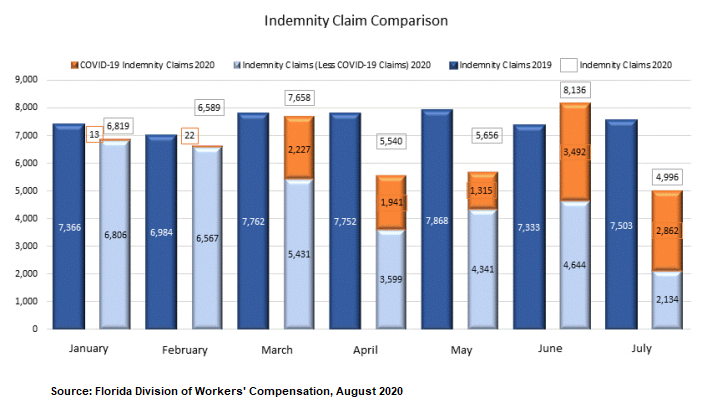Workers’ Comp rates declining again
As the number of coronavirus cases has grown in Florida, so too has the number of workers’ compensation insurance claims from those who say they’ve been infected. A new report shows that nearly 12,000 COVID-19 related claims – more than one of every four workers’ comp claims – have been filed this year through July. And nearly 43% of those were denied coverage.
The Florida Division of Workers’ Compensation report shows that COVID-19 claims started small, from just 13 in January and 22 in February, to 2,862 in July. Of the total of 11,872 COVID claims through July, 4,345 claims came from “protective service workers” and 3,432 claims came from health care workers. Private insurers accounted for 62% of denials, private self-insured trust funds another 10.5%, and government self-insured trust funds another 27%.

The report doesn’t explain reasons for claim denials. It pertains only to indemnity claims, which involve workers injured for a minimum of eight days and eligible to recoup lost wages. It doesn’t include medical-only claims. It has a breakout of different data, including by occupation and location, and there’s a section on telemedicine billing, utilized in treating injured workers.
Meanwhile, NCCI, the company that files rate requests on behalf of Florida’s workers’ compensation insurance companies, has filed a 5.7% rate decrease for the 2021 policy year effective January 1. This would represent the fourth consecutive year that workers’ comp rates have fallen, following a trend of -9.5 in 2018, -13.8 in 2019, and -7.5 this year. Florida regulators are reviewing the request and can adjust it up or down.
In its 2021 Filing Summary, NCCI cited “unprecedented results” from a combination of underwriting discipline, moderating severity, declining frequency, and adequate reserves. “For decades, with few annual exceptions, frequency has continued on a clear downward path driven by technology, safer workplaces, improved risk management, and a long-term shift from manufacturing to service sectors. NCCI has no expectation that this trend will change course,” according to the filing.
However, the filing does not include any data from COVID-19 claims, so NCCI said it “has not yet assessed the potential impact on future rate levels.” NCCI reports its begun tracking cases and collecting additional information necessary for in-depth analysis on the pandemic’s direct and indirect impacts on claim frequency, severity, and durations.
Florida is one of 11 states that have issued executive orders, directives, or emergency rules related to presumptions and/or compensability for COVID-19. You can read more here.
LMA Newsletter of 9-14-20


